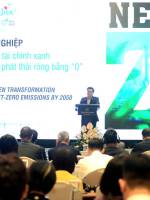
Among 11 solutions outlined in documentation regarding the newly issued implementation plan for the Power Development Plan VIII (PDP8), creating and mobilising capital to develop the electricity industry requires additional specific instructions from the Ministry of Industry and Trade (MoIT) as well as other agencies. A power purchase agreement (PPA) is one of the most sought-after instructions.
The PDP8 and its implementation plan mention a series of domestic gas thermal power projects and projects using imported liquefied natural gas (LNG) that will operate sometime between 2027 and 2030. By then, the total domestic gas thermal power capacity will be 14,930MW and the total LNG thermal power capacity will reach 22,400MW.
One of the prerequisites for large power projects to be implemented as set out in the PDP8 is that financial issues related to the power industry need to be more detailed and specific because it takes several years to implement a power project, at which 2-4 years are required to negotiate the PPA and arrange loans.
The MoIT’s report sent to the government last December calculated that it would take 7-10 years to complete any LNG power project, which includes completing and approving the feasibility report and necessary legal documents, as well as negotiating the PPA and arranging loans, depending on the capacity and experience of the investor.
The Nhon Trach 3 and 4 power plants are a case in point. In February 2019, they received investment planning approval. In March 2022, the investor signed the engineering, procurement, and construction contract with an implementation period of 36 months. Nhon Trach 3 is expected to start generating commercial electricity in November this year and Nhon Trach 4 in May 2025, but the PPA has still not yet been signed.
“We are closely monitoring the disbursement process of Nhon Trach 3 and 4, and know that some of the disbursements have collateral from other sources of the investor. The export credit loan using the project’s revenue has not yet been disbursed,” said an expert on the issue from a European financial institution.
Banks must look at the official PPA to know the cash flow, profit, and loss to decide to lend to the project. It is obvious that there are also projects where investors mortgage other assets instead of the project itself, and can still arrange loans, but these cases are few, he said.
“Before being able to arrange capital, few private and foreign investors will dare to spend billions of USD building large projects if they cannot be sure about their fate. Therefore, to accelerate large ventures, they need more detailed and more specific guides relating to financing,” the expert added.
Thanh Huong




